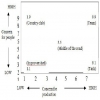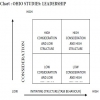Management Concepts & Organisational Behaviour - Leadership
Michigan Studies - Leadership
Posted On :
The Institute for Social Research at the University of Michigan conducted empirical studies to identify styles of leader behavior that results in higher performance and satisfaction of a group.
Michigan Studies
The Institute for Social Research at the University of Michigan conducted empirical studies to identify styles of leader behavior that results in higher performance and satisfaction of a group. The studies identified two distinct styles of leadership.
The employee centred leaders concentrate on human relations and emphasize delegation of authority, concern for employee needs, welfare, advancement, etc. Leaders who are described as employee oriented stress the relationship aspects of the job. They feel that every employee is important and take interest in everyone, accepting their individuality and personal needs. Production centred leadership is more concerned with maximizing regardless of the employees needs, welfare and aspirations. Managers don’t attach much importance to the human element.
The Michigen Studies found that both the styles of leadership led to increase in production, but it was slightly more in case of production centred style. However, the use of direct pressure and close supervision led to decreased satisfaction and increased turnover and absenteeism. The employee centred approach led to improved work flow and more cohesion in interactions resulting in increased satisfaction and decreased turnover and absenteeism. This suggested the superiority of the employee centred leadership style over the production centred style.
The value of Michigan studies lies in the analysis of two leadership styles, task and employee oriented leadership. Instead of restricting to traits of leaders, they concentrated on the behavior of leaders. These studies are criticized on the following grounds:
The Michigan studies failed to suggest whether leader behavior is a cause or effect. They did not clarify whether the employee centred leadership makes the group productive or whether the highly productive group induces the leader to be employee centred.
The Michigan Studies did not consider the nature of the subordinates’ tasks or their personal characteristics. Group characteristics and other situational variables were also ignored.
The behavioural styles suggested by Michigan Studies have been termed as static. A leader is supposed to follow either of the two styles, viz., task orientation and employee orientation. But in practice, a particular style may succeed in one situation and fail in another. Moreover, leaders don’t restrict themselves to a particular style. They adopt both the orientations in varying degrees to suit the particular situation.
The Institute for Social Research at the University of Michigan conducted empirical studies to identify styles of leader behavior that results in higher performance and satisfaction of a group. The studies identified two distinct styles of leadership.
Employee Centred leadership and Production Centred (task oriented) leadership:
The employee centred leaders concentrate on human relations and emphasize delegation of authority, concern for employee needs, welfare, advancement, etc. Leaders who are described as employee oriented stress the relationship aspects of the job. They feel that every employee is important and take interest in everyone, accepting their individuality and personal needs. Production centred leadership is more concerned with maximizing regardless of the employees needs, welfare and aspirations. Managers don’t attach much importance to the human element.
The Michigen Studies found that both the styles of leadership led to increase in production, but it was slightly more in case of production centred style. However, the use of direct pressure and close supervision led to decreased satisfaction and increased turnover and absenteeism. The employee centred approach led to improved work flow and more cohesion in interactions resulting in increased satisfaction and decreased turnover and absenteeism. This suggested the superiority of the employee centred leadership style over the production centred style.
Evaluation of Michigan Studies
The value of Michigan studies lies in the analysis of two leadership styles, task and employee oriented leadership. Instead of restricting to traits of leaders, they concentrated on the behavior of leaders. These studies are criticized on the following grounds:
The Michigan studies failed to suggest whether leader behavior is a cause or effect. They did not clarify whether the employee centred leadership makes the group productive or whether the highly productive group induces the leader to be employee centred.
The Michigan Studies did not consider the nature of the subordinates’ tasks or their personal characteristics. Group characteristics and other situational variables were also ignored.
The behavioural styles suggested by Michigan Studies have been termed as static. A leader is supposed to follow either of the two styles, viz., task orientation and employee orientation. But in practice, a particular style may succeed in one situation and fail in another. Moreover, leaders don’t restrict themselves to a particular style. They adopt both the orientations in varying degrees to suit the particular situation.
Tags : Management Concepts & Organisational Behaviour - Leadership
Last 30 days 1253 views














